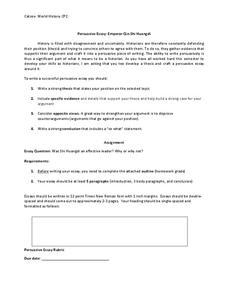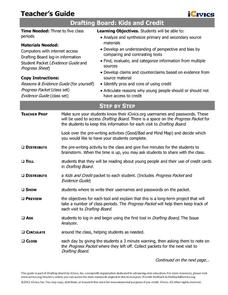American Chemical Society
What is a Chemical Reaction?
When a candle burns down, what happens to the mass that appears to be shrinking? Lesson begins with a demonstration of the chemical reaction of a candle burning. Then scholars use atom models to observe conservation of mass concretely.
American Chemical Society
Does Temperature Affect Dissolving?
When making sweet tea, why do people dissolve the sugar in hot tea instead of cold tea? The class discusses the previous lab and builds upon it. Working in groups, they design an experiment to determine how temperature affects the...
American Chemical Society
Using Dissolving to Identify an Unknown
There is a solvent called aqua regis that can dissolve gold! After observing a solubility demonstration, groups receive four known crystals and one unknown. Based on the demo, they design an experiment to determine the identity of the...
American Chemical Society
Represent Bonding with Lewis Dot Diagrams
Lewis dot diagrams, Lewis dot structures, and electron dot diagrams are all the same thing. Young scientists learn how to draw Lewis dot diagrams and come to understand how dots and dashes represent valence electrons and ionic or...
American Chemical Society
Air, It's Really There
Love is in the air? Wrong — nitrogen, oxygen, and carbon dioxide are in the air. The final lesson plan in the series of five covers the impact of temperature on gases. Scholars view a demonstration of gas as a type of matter before...
American Chemical Society
The Ups and Downs of Thermometers
What has a thermometer earned that your pupils haven't? A degree! After reviewing the previous lessons about molecules and degrees, scholars observe how thermometers work before building their own. The module includes a activity sheet.
American Chemical Society
Molecules in Motion
I heard that oxygen and magnesium were going out and I was like "O Mg." Pupils experiment with adding food coloring to water of various temperatures in order to determine how temperature impacts molecular movement. This is the...
American Chemical Society
Moving Molecules in a Solid
Who likes magic shows? In the fourth of five lessons, pupils view a scientific magic trick. The ball fits through the ring easily, but then moments later, it won't pass through anymore. What changed? Can we reverse the change? Scholars...
American Chemical Society
Molecules Matter
Did you know that jumping spiders sometimes wear water droplets as hats? A seventh grade science lesson introduces the concept of what makes up water: tiny molecules that are attracted to each other. Starting with a chemistry discussion,...
National Science Teacher Association
Middle School Sampler: Science
Focus on inquiry-based learning in your science class with a series of activities designed for middle schoolers. A helpful packet samples four different texts, which include activities about predator-prey relationships, Earth's axis and...
Scholastic
Drones Take Off
Ever wonder what drones are doing high above us in the sky? This article gives your class an insight to what those robots in the sky are doing. After reading an article on drone technology, pupils are prompted to respond to a variety of...
Curated OER
Persuasive Essay
Next time you assign your young historians to write a persuasive essay, use this document as a starting point and support them with a rubric, tips for writing a successful persuasive piece, and a general essay outline.
Mr. Roughton
Cold Case Rome
Pupils are transformed into detectives in the case to solve the motive behind the assassination of Julius Caesar. This resource includes eight engaging "exhibits" of unique primary and secondary sources for students to analyze during...
Mr. Roughton
Reformation Dossiers
If you were living during the Reformation and had to choose between arresting Henry VIII, Pope Leo X, or the Grand Inquisitor of the Catholic Church, who would you pick? This engaging assignment will have your young historians critically...
Mr. Roughton
Roman Empire
Does the United States parallel the Roman Empire in any way? Young historians work with four documents in order to answer this query as part of a structured DBQ assignment.
Federal Reserve Bank
Savvy Savers
What are the benefits and risks of saving in an interest-bearing account? Pupils explore concepts like risk-reward relationship and the rule of 72, as well as practice calculating compound interest, developing important personal finance...
iCivics
Drafting Board: Community Service
Should schools impose community service graduation requirements? In the final lesson of the Drafting Board series, learners solidify their practice of crafting an argument supported by sound reason and evidence.
iCivics
Drafting Board: Electoral College
Should the president of the United States be voted by the Electoral College or the popular vote? Your young historians will consider the pros and cons of the Electoral College, and make an argument using reasons and evidence provided in...
iCivics
Drafting Board: Kids and Credit
Should kids under the age of 18 be given access to credit cards? Learners identify pros and cons of using credit, develop claims based on evidence, and finally argue reasons for or against credit for minors.
iCivics
Drafting Board: Military Intervention
Should countries use their militaries to stop humanitarian crises in other countries? Learners make claims, organize their reasoning, and provide evidence for their arguments with this rich resource.
iCivics
Drafting Board: Interest Groups
Does the influence of interest groups harm a political system? Your class members will analyze the role of interest groups in American politics, as well as consider the effect of perspective, bias, loyalty, and the First Amendment.
Thomas Jefferson Foundation
Personal Morals vs. Political Moves Document Based Essay
Was Thomas Jefferson a hypocrite? Tackle this question with primary source analysis and an essay. The packet includes historical background, a writing prompt, a combined outline and checklist, and ten primary documents paired with...
Federal Reserve Bank
Ben Franklin: Highlighting the Printer
By studying Benjamin Franklin's work as a printer, your class will have a fantastic opportunity to learn about the economic concepts of entrepreneurship, human capital, and investment.
University of Chicago
Comparing Modern and Ancient Ideas of Ethnicity and Identity
Explore ethnicity and identity with a research and writing assignment. Class members conduct online research, looking in particular at images and carefully noting down their sources on notecards. They read about identity and compose...

























